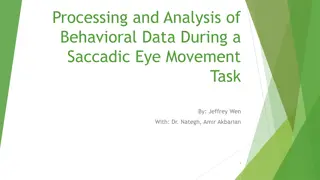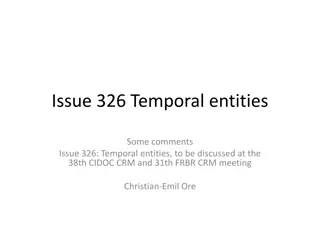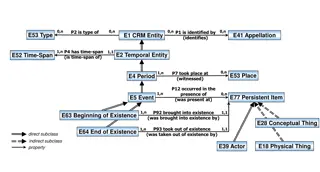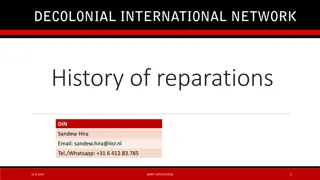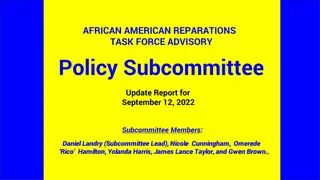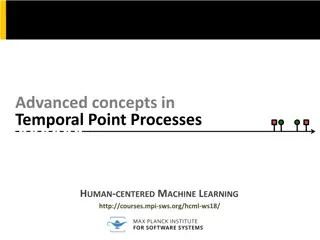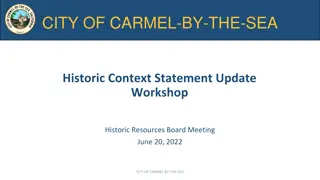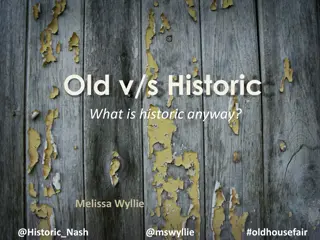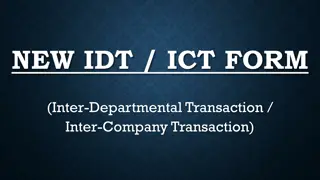Examining Reparations for Historic Enslavement: Inter-temporal Challenges
The Law & Race Speaker Series on applying past laws to ongoing wrongs explores the complexities of seeking reparations for historic enslavement. The discussion delves into the inter-temporal considerations, touching on reparation claims by CARICOM, the impact of transatlantic chattel slavery on global power dynamics, and the historical contexts of slavery's role in Western development. The session aims to provide a nuanced perspective on the legal and moral dimensions of addressing past injustices.
Download Presentation

Please find below an Image/Link to download the presentation.
The content on the website is provided AS IS for your information and personal use only. It may not be sold, licensed, or shared on other websites without obtaining consent from the author. Download presentation by click this link. If you encounter any issues during the download, it is possible that the publisher has removed the file from their server.
E N D
Presentation Transcript
Applying past laws to ongoing wrongs? The limits of inter-temporality when envisioning reparations for historic enslavement Law & Race Speaker Series, 6 March 2023 Ashrutha Rai & Henning Grosse Ruse - Khan Faculty of Law
Outline Starting points for our analysis Question of inter-temporality: deciding reparation claims based on the laws governing at the time or current rules & principles? The general rule and its limits Law, legality and morality Conflicts-of-law methods for determining applicable law Towards a more nuanced approach, applied to reparation claims
Starting points: reparation claims In 2013, CARICOM established the CRC to pursue reparations from former European colonial powers for the Crimes against Humanity of Native Genocide, the Trans-Atlantic Slave Trade and a racialized System of Chattel Slavery . In a 10-point plan for reparatory justice,the CRC also refers to subsequent centuries of racial apartheid and policies designed to perpetuate suffering . Relief sought includes: a full formal apology, repatriation, debt relief, technology transfer, alleviating the public health crises & irradicating illiteracy, promoting African knowledge & psychological healing. So far, claims focus on States not other (private) parties / institutions involved, or who benefitted.
Starting points: historic context 1) Current global power relations, economic prosperity and poverty of peoples are significantly affected by transatlantic chattel slavery ( ) the veiled slavery of the wage-laborers in Europe needed the unqualified slavery in the New World as its pedestal (Karl Marx, 1867) Transatlantic slavery was the fuel that powered Western development. It was the massive wealth derived from the system that allowed the West to catch up with and then overtake the rest of the world. Slavery was not new: Europe developed on the back of the Arab slave trade that was hundreds of years old when Columbus sailed back from Hispaniola with indigenous Americans to sell into slavery. But the transatlantic trade was a unique development, reducing Africans to subhuman commodities who became the major currency for Western progress. (Andrews, The new age of Empire, 2021)
Starting points: historic context The commercial capitalism of the eighteenth century developed the wealth of Europe by means of slavery and monopoly. But in doing so it helped to create the industrial capitalism of the nineteenth century, which turned around and destroyed the power of commercial capitalism, slavery, and all its works. (Williams, Capitalism and Slavery, 1944 see also Beckles, 2021) the Northwestern European States provided manufactures, which were shipped to Africa in exchange for slaves. Slaves were then shipped to American plantations, which subsequently provided raw materials that were sold back in Northwestern Europe. Subsequently, the accumulated wealth generated from these activities was reinvested into the core financing of the technological developments that resulted in the Industrial Revolution. (Anievas and Nisancioglu, How the West came to rule, 2015)
Starting points: continued wrongs 2) The moral and ethical wrongs of transatlantic chattel slavery have continued as inhumane systems of racial discrimination, with continuing impact on African peoples and the descendants of those enslaved [T]hese historical injustices [slavery, the slave trade and subsequent racist practices] have undeniably contributed to the poverty, underdevelopment, marginalization, social exclusion, economic disparities, instability and insecurity that affect many people in different parts of the world, in particular in developing countries. (UN World Conference against Racism, Final Declaration, Durban South Africa, 8 September 2001, UN Document A/CONF.189/12, para. 158) No single state has comprehensively faced and addressed its impact on the lives of people with African descent today (UN High Commissioner for Human Rights, 12 July 2021)
Starting points: future impacts 3) From continuing to future impact: We were the ones whose blood, sweat and tears financed the industrial revolution. Are we now to face double jeopardy by having to pay the cost as a result of those greenhouse gases from the industrial revolution? That is fundamentally unfair. ( ) we are going to see an increase in climate refugees. We know that by 2050, the world s 21 million climate refugees today will become 1 billion. (HE Motley, Prime Minister of Barbados, at CoP 27) As climate impacts accelerate, we can expect them to perversely distribute the costs and burdens of climate change, disproportionately impacting those who have been rendered most vulnerable given the accumulated weight of history. (Taiwo, Reconsidering Reparations, 2022)
A case for reparatory justice There are deontological and consequential reasons to focus on the transatlantic slave trade and the chattel slavery of Africans that it brought about as something which is qualitatively and quantitatively different to other forms of slavery, servitude or bonded labour that have been prevalent so many times in human history. Chattel slavery and transatlantic slave trade as an ongoing wrong which demands our attention, and action. What role does law play in facilitating (or not) reparatory justice? What legal principles and rules operate to address the past harm & injustice, as it continues and affects today?
Inter-temporality: The Rule The doctrine of international law whereby a juridical fact must be appreciated in the light of the law contemporary with it, and not of the law in force at the time when the dispute in regard to it arises or falls to be settled : Island of Palmas Case (1928) 2 R.I.A.A. 831 at 845. The Arbitrator, Max Huber, went further : As regards the question which of different legal systems prevailing at successive periods is to be applied in a particular case (the so-called inter-temporal law), a distinction must be made between the creation of rights and the existence of rights. The same principle which subjects the acts creative of a right to the law in force at the time the right arises, demands that the existence of the right, in other words its continued manifestation, shall follow the conditions required by the evolution of law .
Inter-temporality: The Rule Article 28 VCLT : Unless a different intention appears from the treaty or is otherwise established, its provisions do not bind a party in relation to any act or fact which took place or any situation which ceased to exist before the date of the entry into force of the treaty with respect to that party. Article 31(3)(c) VCLT: There shall be taken into account, together with the context: ... any relevant rules of international law applicable in the relations between the parties . Article 13, ARSIWA: An act of a State does not constitute a breach of an international obligation unless the State is bound by the obligation in question at the time the act occurs.
Inter-temporality: The Rule Text Description automatically generated
Inter-temporality: Its Limits Treaties Article 28, Unless a different intention appears An essential characteristic therefore of Protocol XII [is] that its effects extend to legal situations dating from a time previous to its own existence (Mavrommatis Palestine Concessions (Greece v. UK) 1924 PCIJ (ser A) No 2, 34) Evolutionary Interpretation Once it is established that the expression "the territorial status of Greece" was used in Greece's instrument of accession as a generic term , the presumption necessarily arises that its meaning was intended to follow the evolution of the law and to correspond with the meaning attached to the expression by the law in force This presumption, in the view of the Court, is even more compelling when it is recalled that the 1928 Act was a convention of the most general kind and of continuing duration (Aegean Sea Continental Shelf Case (Greece v. Turkey) [1978] ICJ Rep 1)
Inter-temporality: Its Limits Customary International Law Closed and open situations (Gruber, Aus ILJ, 2019) Viewing the past through the present: Contextualising Palmas The Minquiers and Ecrehos Case (France/United Kingdom), [1953] ICJ Rep 47 Legal Consequences of the Separation of the Chagos Archipelago from Mauritius in 1965, Advisory Opinion, [2019] ICJ Rep 95 Continuing Wrong
Inter-temporality: Its Limits Continuing Wrong (contd.): Article 14(2), ARSIWA: The breach of an international obligation by an act of a State having a continuing character extends over the entire period during which the act continues and remains not in conformity with the international obligation. Article 15(2), ARSIWA: (aggregate or composite acts) In such a case, the breach extends over the entire period starting with the first of the actions or omissions of the series and lasts for as long as these actions or omissions are repeated and remain not in conformity with the international obligation. Examples from International Criminal Law: Forced marriages (Special Court for Sierra Leone, Prosecutor v Sesay, Trial Judgment (2 March 2009)) Child soldiers (Prosecutor v. Sesay) Joint Criminal Enterprise (Extraordinary Chambers in the Courts of Cambodia, Case 002/01 Prosecutor v Nuon and Khieu, Appeal Judgment (23 November 2016)) Domestic Human Rights (genocide of indigenous populations in Australia and Canada)
Inter-temporality: Its Limits International Criminal Law (contd.) Nuremberg & Tokyo and the Crime of Aggression [N]o category of war became a crime in international law up to the date of the commencement of the world war under our consideration The so-called trial held according to the definition of crime now given by the victors obliterates the centuries of civilization which stretch between us and the summary slaying of the defeated in a war (Int'l Military Tribunal for the Far East Judgement, dissentient opinion of Judge Pal, paras 37, 152) A Jus Cogens Exception?
Inter-temporality: Its Limits Jus Cogens Exception (contd.) Separate Opinion of Judge Ranjeva, Land and Maritime Boundary between Cameroon and Nigeria The inequality and denial of rights inherent in colonial practice in relation to indigenous peoples and to colonies is currently recognized as an elementary truth; there is a resultant duty to memorialize these injustices and at the same time to acknowledge an historical fact. . Application of the rules of intertemporal law cannot justify conclusions so contrary to fundamental norms (Cameroon v. Nigeria: Eq. Guinea interv., [2002] ICJ Rep 303) ARSIWA Commentary to Art. 13: But even when a new peremptory norm of general international law comes into existence, , this does not entail any retrospective assumption of responsibility. Accordingly, it is appropriate to apply the intertemporal principle to all international obligations It is, however, without prejudice to the possibility that a State may agree to compensate for damage caused as a result of conduct which was not at the time a breach of any international obligation in force for that State. Inter-temporality as a choice? De lege ferenda?
Inter-temporality: Its Limits Inter-temporality as a choice (contd.) Institut de Droit International, Resolution on The Intertemporal Problem in Public International Law (1975) Whereas it is necessary to promote the development of the international legal system whilst preserving the principle of legal stability which is an essential part of any juridical system ; 1. Unless otherwise indicated, the temporal sphere of application of any norm of public international law shall be the rules of law that are contemporaneous with [the facts]. 2. In application of this principle : c) any rule which relates to an actual situation shall apply to situations existing while the rule is in force, even if these situations have been created previously ; g) any rule which relates to the continuous effects of a legal act shall apply to effects produced while the rule is in force, even if the act has been performed prior to the entry into force of the rule ; 3. States and other subjects of international law shall, however, have the power to determine by common consent the temporal sphere of application of norms, notwithstanding the rules laid down in Paragraphs 1 and 2 and subject to any imperative norm of international law which might restrict that power.
Moral limits of inter- temporality? A Moral Imperative for retroactivity (Sands, 2021)? Non-application of inter-temporality: no legitimate interest to protect legal certainty in case of fundamentally unjust & contested rules (Buser, 2017) Qualification as Non-law: The positive law, secured by legislation and power, takes precedence even when its content is unjust and fails to benefit the people, unless the conflict between statute and justice reaches such an intolerable degree that the statute, as flawed law , must yield to justice. ( ) [In addition], wherever law not even attempts to achieve justice and where equality ( ) is purposively denied, then the statute is not merely flawed law , it lacks completely the very nature of law. For law, including positive law, cannot be otherwise defined than as a system and an institution whose very meaning is to serve justice. (Radbruch, 1946)
Law, legality and morality Does law need to be moral (or not immoral) to be law? Legal positivism s Separation Thesis: Law is law, regardless of morality. Moral / ethical interpretation is a matter of politics, not law. Immoral laws do not lack the quality of law, but if laws reach[ ] a certain degree of iniquity then there [is] a plain moral obligation to resist them and to withhold obedience. (Hart, 1958, 617) The Inner Morality of Law: a dictatorship which clothes itself with a tinsel of legal form can so far depart from the morality of order, from the inner morality of law itself, that it ceases to be a legal system (Fuller, 1958, 660) How far is there a real difference between Hart and Radbruch? For Radbruch, judges are legally entitled to invalidate extremely unjust laws, while for Hart judges are morally entitled to refuse to apply them (Dyzenhaus, 2008, 1022-23)
strong moral claims are not easily converted into successful legal causes of action (NYDC, 2019) What would a morality qualification mean for int law? If we wish to lend any moral force / legitimacy to the label of int law, then that which carries this label needs to show how it reflects morality (?) But: Int law generally lacks hierarchy and constitutional order, is driven by power relations and the political hence need to avoid unilateral determinations of morality by the powerful So states should not individually disapply int law, arguing it is immoral but collective determinations of morality (e.g. in form of the ius cogens prohibition of slavery) could be given effect, including by disregarding int rules that conflict with ius cogens in reparation claims See again Art.71 VCLT on treaty rules conflicting with ius cogens: aim to eliminate the consequences of ius cogens breaches
An analogy from conflict-of-laws methods? CoL rules decide on territorially competing laws can its methods be applied to temporally competing laws? Determining applicable law based on closest connection (Savigny): o Hence generally, applying the law at the time of conduct (incl. continuing acts) o BUT exceptions in cases where: international mandatory norms demand application regardless of closest connection (here: ius cogens norms incl. on prohibition of slavery); or the outcome of applying most closely connected law is contrary toordre public (outcome per se fundamentally unjust here in form of (continued) injustice and discrimination and suffering of peoples of African descent); Alternatively, government interest analysis (Currie): deciding applicable law by judging which set of laws / rules has a stronger claim to be applied (here, what norms demand application & what is their scope, incl. temporal reach)?
Common contours of an ordre public test I know that over 300 years ago Hobart C.J. said the "Public policy is an unruly horse." It has often been repeated since. So unruly is the horse, it is said [per Burrough J. in Richardson v Mellish (1824) 2 Bing. 229 , 252], that no judge should ever try to mount it lest it run away with him. I disagree. With a good man in the saddle, the unruly horse can be kept in control. It can jump over obstacles. It can leap the fences put up by fictions and come down on the side of justice ( ) (Lord Denning, [1971] 1 All ER 215, AT 219) Common Framework for public policy exceptions (Mills, 2008; Meyer, 2022) Relative importance of the interest / principle to be protected: from domestic values to a transnational public policy (incl. prohibition of slavery) Seriousness of its violation: requiring results amounting to a manifest breach Effect of the violation on the lex fori : demanding a close connection to the domestic legal order
Public policy as a universal concept Next to disapplying an otherwise applicable law, also a foreign judgment as well as an arbitral award may be refused recognition and/or enforcement on the grounds that it is manifestly contrary to public policy in the state of recognition or enforcement (Brussels I Reg); or that recognition or enforcement of the award would be contrary to the public policy of that country (Art.V:2(b) NY Convention) [I]n the sphere of private international law the exception of ordre public, of public policy, as a reason for the exclusion of foreign law in a particular case is generally or, rather, universally recognized ; so that ordre public must be regarded as a general principle of law (Application of the Convention of 1902 Governing the Guardianship of Infants (Netherlands v Sweden) [1958] ICJ Reports 55, Judge Lauterpacht, at 92) see also Lipstein (who rather relies on sovereignty)
A more nuanced approach to inter-temporality (1) principal starting point to judge past conduct in accordance with law applicable at the time, hence protecting the expectations (if legitimate) of those acting under those laws BUT divergence from that basic principle, based on factors such as: (2) continued impact of past conduct on current situation (see also climate change-related reparations claims); (3) past conduct which not only has significant ongoing effects, but also represents severe violation of core public policies / moral principles; (4) applying current laws has a greater potential to achieve just outcomes by rectifying harm, offering satisfaction & healing to those affected by past wrongs
Consequences of unchecked inter-temporality Not considering ordre public exceptions for inter-temporality is essentially issuing a blank cheque of legality (and hence legitimacy) to past normativity, regardless how far it deviates from our current norms and values. Given that past international law tends to reflect the interest of those (Western States) with sufficient influence to shape the law, an unchecked application of past laws will reinforce and reproduce the (political and economic) power relations of the past, with the potential of manifesting long-standing dominance and oppression.
What follows for reparation claims? If exceptions or limits to inter-temporality are taken serious, the door opens for considering the question of (legal) responsibility: of States: based on (current) ILC Articles of State Responsibility (ASR) which require (1) cessation; (2) guarantees of non-repetition; and (3) reparation including restitution, (2) compensation, (3) satisfaction Based on the concept of unjust enrichment (commonly seen as a general principle of law but leaving important issues uncertain) of private actors (where claims remain in principle a matter of domestic law but where inter-temporality should not serve to prevent claims)
Preliminary conclusions Inter-temporality as a strict dogma reinforces and perpetuates the power relations and resulting injustices of the past The practice of int Courts & Tribunals indicates various tools that allow to overcome inter-temporality as a rigid rule Private international law has long operated nuanced tools to give effect to core public policies and moral principles Hence, there is no argument of doctrinal impossibility in considering current laws for past conduct On balance, an international consensus on what is just should outweigh legal certainty especially in judging past acts with significant consequences for today and tomorrow
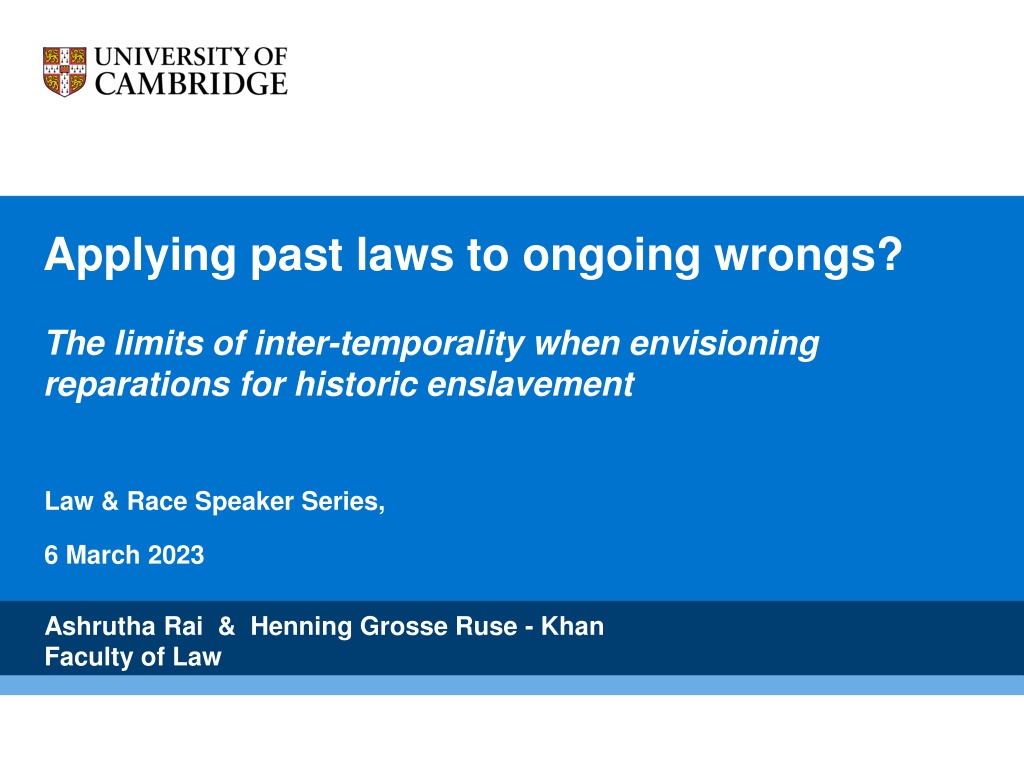


![❤[PDF]⚡ Apollo Mission Control: The Making of a National Historic Landmark (Spr](/thumb/21551/pdf-apollo-mission-control-the-making-of-a-national-historic-landmark-spr.jpg)



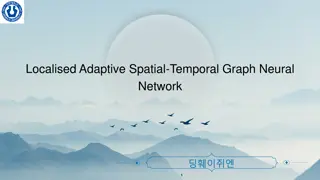
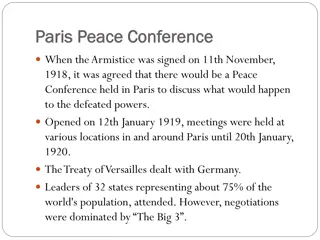

![ANC Women's League Oral Submission on Expropriation Bill [B23.2020]](/thumb/136076/anc-women-s-league-oral-submission-on-expropriation-bill-b23-2020.jpg)
